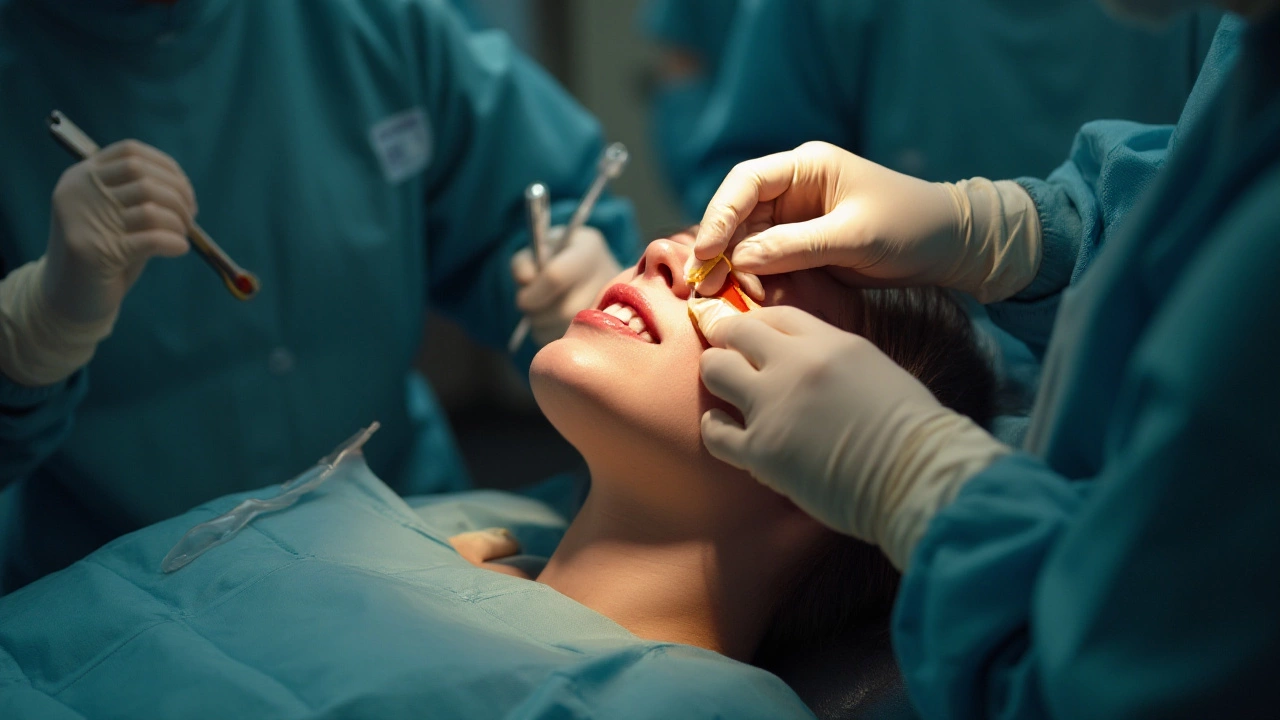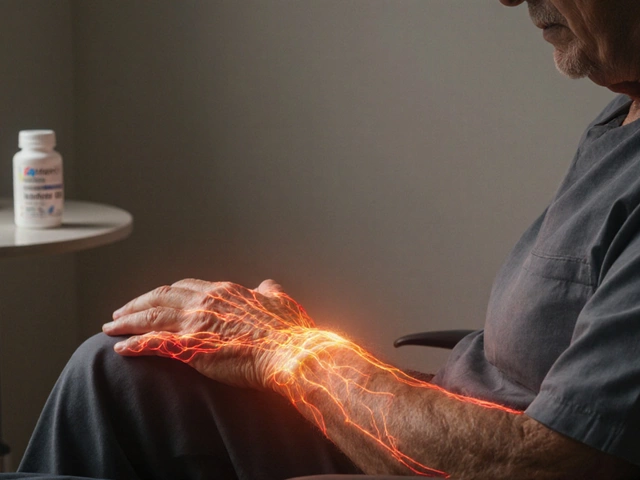When it comes to enhancing one's appearance through cosmetic surgery, knowing about the likely recovery experience is as crucial as understanding the procedure itself. Some cosmetic surgeries are harder to bounce back from than others, often due to the invasive nature of the work or the extent of changes made to the body.
Facelifts and tummy tucks are among those notorious for a tougher recovery, given the complexity and areas affected which mean more time and patience are essential. In this article, we'll delve into why these surgeries stand out in terms of recovery difficulty, providing practical advice and tips to help manage the healing process effectively.
Getting prepared can make a world of difference, not only physically but mentally as well, ensuring that you are equipped to handle both the expected and unexpected aspects of your post-operative journey.
- Understanding Recovery Challenges
- Notable Cosmetic Surgeries
- Recovery Tips for Better Healing
- Emotional and Physical Effects
- Making Informed Decisions
Understanding Recovery Challenges
Navigating the world of cosmetic surgery is as much about understanding the journey to recovery as it is about choosing the right surgeon or procedure. It's a path that demands patience, awareness, and meticulous care. When we speak of the challenges inherent in recovering from surgeries such as facelifts or tummy tucks, what we are often referring to is the physiological and psychological terrain that needs to be steadily traversed.
Each procedure inherently comes with its unique set of hurdles. For instance, a facelift may leave one dealing with facial swelling, bruising, and a temporary loss of sensation that can last for several weeks. Meanwhile, a tummy tuck usually involves more than just cosmetic alteration—it can impact core strength and mobility as your body heals from the extensive reshaping. This healing process not only affects your physical state but can also test your emotional resolve as you navigate through periods of discomfort and dependency.
Recovery also involves the management of expectations, both self-imposed and external. There is often a misconceived notion that cosmetic surgery promises immediate results, but the real transformation unfolds over time, often taking several months for the final look to manifest. This transformation period can be bewildering, especially when coupled with the reality of post-operative care, which includes managing pain, attending follow-ups, and allowing yourself enough time for a proper rest.
Interestingly, demographic factors such as age and overall health can dramatically sway the recovery timeline. For instance, younger individuals with a more efficient circulatory system usually bounce back quicker than those who might face age-related healing slowdowns. Yet, even so, the rate at which one recovers from major interventions depends significantly on pre-operative preparation, nutritional discipline during recovery, and the proactive management of surgical sites.
In the psychological landscape, a crucial, albeit often overlooked, part of recovery is adjusting to the new normal. The emotional journey could involve everything from initial self-doubt or questioning the choice to have surgery, to eventually embracing and appreciating the enhancements made. Every recovery journey is deeply personal; however, knowing what to expect and having a support system, both medically and socially, can be incredibly beneficial.
"Recovery from plastic surgery isn't a straightforward process. It's a winding road that demands patience and understanding from all who walk it," explains Dr. Linda Li, a respected figure in the field of aesthetic medicine.
Being proactive can significantly ease recovery challenges. Understanding the timeline, having realistic expectations, and knowing specific self-care tips can help. Patients who educate themselves tend to feel more empowered and less anxious during their recovery. By recognizing the nuances of recovery, individuals can better prepare and position themselves to face the challenges head-on, ultimately ensuring a more fulfilling cosmetic surgery experience.
Notable Cosmetic Surgeries
When considering cosmetic surgery, it's worthwhile to know which procedures are often cited as having challenging recoveries. One of the most prominent among these is the tummy tuck, known medically as abdominoplasty. This procedure involves removing excess fat and skin from the abdomen and, in many cases, restoring weakened or separated muscles to create a smoother, firmer profile. The recovery from a tummy tuck can be demanding due to the extensive nature of the surgery. Patients may experience swelling, bruising, and discomfort for several weeks and are often required to limit physical activities for an extended period, typically around six weeks. The surgical incision, which usually spans from hip to hip, needs meticulous care to ensure proper healing and to minimize scarring.
Another procedure that often lands on this list is the facelift or rhytidectomy. This is designed to reduce the appearance of facial wrinkles and other signs of aging, with the goal of enhancing the overall aesthetic of the face and jawline. The facelift surgery involves lifting and tightening the underlying muscles to achieve a more youthful contour, and also involves removing excess pockets of fat and skin. Recovery can be quite challenging, with swelling and bruising persisting for several weeks. Most patients must adhere to strict guidelines to avoid excessive movement of the facial area, which can be a significant lifestyle adjustment. A facelift is not only physically taxing but can also have emotional impacts as patients go through a period of adjusting to their new appearance.
The Neck and Beyond
In the realm of cosmetic surgery, the neck lift deserves mention due to its intricate placement close to vital structures such as nerves and blood vessels. While it can dramatically reshape one's appearance by removing excess skin and sometimes restructuring the underlying muscles, the recovery process requires vigilance to prevent complications. Patients may need to wear special supportive garments and pay close attention to posture and movements that could strain the neck area. The neck lift is particularly popular among individuals seeking to diminish signs of aging that are visible in the lower face and neck area. With advancements in surgical techniques, the neck lift has become more refined, but the recovery still requires an investment in time and care.Considering Rhinoplasty
Lastly, we must not overlook rhinoplasty, commonly referred to as a nose job. This surgery, known for its aesthetic and functional motivations, involves modifying the bone or cartilage framework of the nose to improve its shape or function. The recovery can be longer than anticipated, mainly due to the sensitivity of the nasal region and its vital role in breathing and overall facial symmetry. Patients often experience swelling, bruising around the eyes, and difficulty breathing through the nose in the initial weeks. It's essential to avoid physical impact and rigorous activities, as the newly structured nasal framework requires time to settle completely. As one rhinoplasty expert notes, "Patience is the key. With time, swelling subsides, and one can fully appreciate the results." Blockquote>Understanding these procedures and their recovery paths can prepare you to make educated choices about cosmetic enhancement and to plan your post-operative period effectively. Here, knowledge is power, paving the way for both physical transformation and emotional readiness.
Recovery Tips for Better Healing
Recovering from cosmetic surgery involves a lot more than just rest. It’s figuring out a routine that supports the body’s natural healing processes while also adjusting day-to-day activities to prevent any complications. One of the first steps is understanding how important nutrition is during this time. Eating a balanced diet rich in vitamins and minerals can facilitate quicker healing. Foods such as leafy greens, berries, and lean proteins are excellent at aiding tissue repair and reducing inflammation. Keeping yourself hydrated also plays a crucial role, as water helps transport nutrients to cells and flush out toxins, enabling the body to bounce back more effectively.
That said, the physical aspect isn't the only part you should focus on. Mental and emotional well-being is equally significant in ensuring optimal recovery. Many people experience a range of emotions post-surgery, from happiness to anxiety, which is absolutely normal. Finding regular time to relax, meditate, or engage in light activities like reading can greatly contribute to a positive mindset. Also, don’t hesitate to reach out to support groups or forums where you can share your experiences with others who have undergone similar procedures. As psychologist Dr. Emily White suggests,
"Having a support system can empower individuals, providing them with not only insights but also the emotional reinforcement needed to cope with the challenges of recovery."
Exercise also forms a part of recovery but should be approached with caution. Gentle walking is generally encouraged soon after most surgeries. It improves circulation and prevents blood clots, aiding in the healing process. It's essential, however, to keep movements gradual and controlled. Avoid high-impact activities or any exercise regimen that strains the operated area until cleared by your doctor. Communication with healthcare providers is key; keeping them updated about any unusual symptoms or concerns can prevent complications. Following their advice on postoperative care, such as how to care for incisions and when to return to regular activities, cannot be stressed enough.
Taking Medication Correctly
A common aspect of recovery involves managing pain and discomfort, which is where medications come into play. Properly adhering to the prescribed pain management plan can make significant differences in comfort levels. Be sure to understand which medications should be taken when and if there are any interactions to be wary of, especially with other supplements or over-the-counter drugs. Sometimes, patients might feel the urge to skip doses to avoid perceived side effects, but it's crucial to weigh these decisions carefully, preferably in consultation with your doctor, to avoid hindering recovery.
Lastly, patience is vital. While modern cosmetic procedures are impressively advanced, allowing for quick and often remarkable transformations, the body's healing process is a different story. Each individual heals at their own pace, and understanding this can alleviate pressure and impatience. Celebration comes in small milestones, and soon enough, the full effects of the surgery will be visible and worth all the thoughtful efforts put into comprehensive recovery.
Emotional and Physical Effects
The journey through cosmetic surgery doesn't start and end in the operating room; it extends deeply into the realms of both the emotional and physical healing processes. Each step is intertwined with the expectations and realities that accompany such a significant change to one's physical appearance. During the initial recovery phase, patients might experience bruising, swelling, and discomfort, which are natural responses of the body as it heals. These physical effects can sometimes be overwhelming, particularly for individuals unprepared for the initial appearance post-surgery, which tends to look worse before it gets better. It is vital to keep in mind that patience is a key component in this journey.
Emotionally, undergoing any substantial cosmetic change can stir a range of feelings. It's almost akin to grieving, where a former version of oneself is left behind, and acceptance of the new appearance is required. This can lead to a temporary bout of what many describe as the "post-surgery blues," characterized by feelings of regret, anxiety, or disappointment. According to Dr. Vivian Diller, a respected psychologist with expertise in beauty and self-image, "the emotional impact of cosmetic surgery can be as significant as the physical one, if not more." Understanding and acknowledging these feelings are crucial for a smoother emotional transition.
Support plays a pivotal role during this period. Open communication with surgeons about the expected outcomes and potential risks can aid in setting realistic expectations. Moreover, having a reliable support system of friends or family is indispensable. It's reassuring to have someone there who can help with daily tasks and provide emotional support. While the physical changes are visible, the emotional healing might need more subtle nurturing.
Beyond immediate effects, the impact of cosmetic surgery can ripple across various aspects of an individual's life. The boost in self-confidence post-recovery can improve social interactions and personal relationships. However, it is essential to approach these surgeries with the right mindset, understanding that while they can enhance aspects of one's look, they are not a panacea for deeper self-esteem issues. Maintaining realistic expectations and being mindful of the underlying motivations for undergoing surgery are central to achieving truly satisfying results. Taking time to reflect on these aspects, ideally with the help of a counselor or psychologist, can help ensure a balanced approach to these profound changes.

Making Informed Decisions
When contemplating cosmetic surgery, the journey begins with gathering comprehensive information. Understanding the details of the procedure, possible risks, and especially the recovery period can aid in making a well-informed choice. This involves consulting with experienced surgeons, seeking second opinions, and immersing oneself in credible sources of information. Educational resources, both online and offline, can provide insight into what the surgery involves and the expected lifestyle adjustments during recovery. Speaking with people who have undergone similar procedures can also provide firsthand knowledge and set realistic expectations.
Decision-making doesn't end at gathering facts. Emotional readiness plays a pivotal role in a successful surgery and recovery process. This preparation involves introspection, considering why you are pursuing cosmetic enhancement, and ensuring it's for the right reasons. The decision should be yours alone and not influenced by outside pressures or passing trends. During this phase, mental health support can be invaluable. Psychological evaluations or counseling sessions can help ascertain readiness and address body image perceptions. According to the British Psychological Society, mental preparedness is as crucial as physical health when undergoing any elective surgery.
Financial planning is another significant aspect of making informed decisions. Cosmetic surgeries are not typically covered by insurance, adding an extra layer of consideration. Understanding the full scope of costs, from the procedure itself to post-operative care and potential additional expenses, is vital. Setting aside a budget for unexpected medical needs post-surgery is pragmatic, ensuring that financial strain does not become an added stress post-procedure. As one expert mentions, "Financial peace of mind is as necessary as choosing the right surgeon".
"The decision to undergo cosmetic surgery should always be personal, based on thorough research and thoughtful consideration, not external influences," says Dr. Emily Cartwright, a renowned plastic surgeon.
It's equally important to consider the timing of the surgery. Optimal timing means aligning the procedure with personal circumstances, considering work commitments, family life, and anticipated support during recovery. The body requires time and care to heal, and aligning this period with personal obligations can affect post-operative recovery positively or negatively. Lastly, bear in mind that recovery is a journey, not a quick fix. The body needs time to adapt to changes, so patience is not just a virtue—it’s a necessity.





